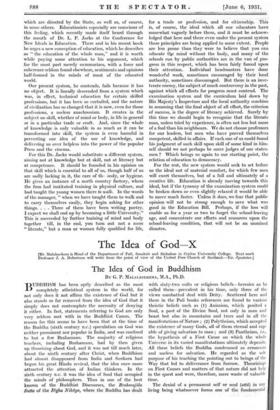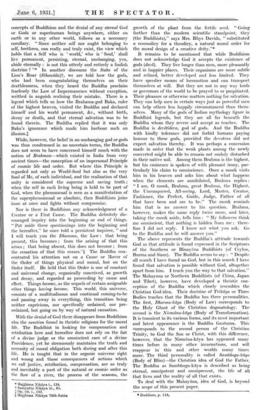The Idea of God—X
Malalasekera is Head of the Department of Pali, Sanskrit and Sinhalese in Ceylon University College. Next week
Professor J. A. Robertson will write from the point of view of the United Free Church of Scotland.—En. Spectator.]
The Idea of God in Buddhism
BY G. P. MALALASEKERA, M.A., Ph.D.
BUDDHISM has been aptly described as the most completely atheistical system in the world, for not only does it not affirm the existence of God but it also stands so far removed from the idea of God that it simply does not contemplate the necessity of denying it either. In fact, statements referring to God are only very seldom met with in the Buddhist Canon. The reason for this seems to have been that at the time of the Buddha (sixth century B.c.) speculation on God was neither prominent nor popular in India, and was confined to but a few Brahamans. The majority of religious teachers, including Brahamans, had by then given up theorizing about God, and it was not till much later, about the ninth century after Christ, when Buddhism had almost disappeared from India and Sankara had begun his great Hindu revival, that the idea once more -attracted the attention of Indian . thinkers. In the sixth century B.C. it was the idea of Soul that occupied the minds of philosophers. Thus in one of the best known of the Buddhist Discourses, the Brahmajcila Sutta of the Digha Nikaya, where the Buddha has dealt with sixty-two cults or religious beliefs—heresies as he called them—prevalent in his time, only three of the views combatted deal with Deity. Scattered here and there in the Tali books references are found to various theistic beliefs such as (1) Animism, which posited a Soul, a part of the Divine Soul, not only in man and beast but also in mountains and trees and in all the manifestations of Nature ; (2) Polytheism, which accepted the existence of many Gods, all of them eternal and cap- able of giving salvation to man ; and (3) Pantheism; i.e., the hypothesis of a First Cause on which the whole Universe in its varied manifestations ultimately. depends. All these beliefs the Buddha condemned as erroneous and useless for salvation. He regarded as the sole purpose of his teaching the pointing out to beings of the Way that led to deliverance from. Sorrow.. Theorizings on First Causes and matters of that nature did not help in the quest and were, therefore, mere waste of valuable time.
The denial of a permanent self or soul (atta) in any living being whatsoever forms one of the fundamental concepts of Buddhism and the denial of any eternal God or Gods or superhuman beings anywhere, either on earth or in any other world, follows as a necessary corollary. " Since neither self nor aught belonging to self, brethren, can really and truly exist, the view which holds that a Self who is ' world,' who is ' Soul,' shall live permanent, persisting, eternal, unchanging, yea, abide eternally : is not this utterly and entirely a foolish doctrine. ? "* In another discourse the Sutta of the. Lion's Roar (Sihanada)t, we are told how the gods, who had been congratulating themselves on their deathlessness, when they heard the Buddha proclaim fearlessly the Law of Impermanence without exception, writhed in anguish realizing their mistake. There is a legend which tells us how the Brahama-god Baka, ruler of the highest heaven, visited the Buddha and declared himself and his world permanent, &c., without birth, decay or death, and that eternal salvation was to be found therein. The Buddha replied that it was only Baka's ignorance which made him harbour such an illusion.t While, however, the belief in an unchanging god or gods was thus condemned in no uncertain terms, the Buddha does not seem to have concerned himself much with the notion of Brahman—which existed in India from very ancient times—the conception of an impersonal Principle of cosmic life and order. But where this Principle is regarded not only as World-Soul but also as the very Soul of Me, of each individual, and the realization of that unity is considered the supreme and saving truth ; when the self in each living being is held to be part of God, when the phenomenal is seen as a manifestation of the superphenomenal or absolute, then Buddhism joins issue at once and fights without compromise.
Nor is there in Buddhism any acknowledgment of a Creator or a First Cause. The Buddha definitely dis- couraged inquiry into the beginning or end of things. " Put aside these questionings into the beginning and the hereafter," he once told a persistent inquirer, " and I will teach you the Dhamma, the Law : that being present, this becomes ; from the arising of that this arises ; that being absent, this does not become ; from the cessation of that this ceases."§ The Buddha con- centrated his attention not on a Cause or Mover of the Order of things physical and moral, but on the Order itself. He held that this Order is one of constant and universal change, organically conceived, as growth and decay, and regarded as proceeding by cause and effect. Things become, as the sequels of certain assignable other things having become. This world, this universe, consists of a multitudinous and continual coming-to-be and passing away in everything, this transition being neither capricious, nor specifically ordained, nor pre- ordained, but going on by way of natural causation.
With the denial of God there disappears from Buddhism also the sanction found in theistic religions for the moral life. The Buddhist in looking for compensation and retribution here and hereafter does not rely on the fiat of a divine judge or the omniscient care of a divine Providence, yet he strenuously maintains the truth and necessity of moral obligation both during and after this life. He is taught that in the organic universe right and wrong and those consequences of actions which we call justice, retribution, compensation, are as truly and inevitably a part of the natural or cosmic order as the flow of a river, the process of the seasons, the
* Majjhima Nikaya i., 138. t Samytitta Nikaya iii., 85. Op. cit. 1., 142.
§ Alajihima Nikitya 79th Sutta
growth of the plant from .the fertile seed. " Going farther than the modern scientific standpoint, they (the Buddhists)," says Mrs. Rhys Davids, " substituted a cosmodicy for a theodicy, a natural moral order for the moral design of a creative deity."* It remains to be mentioned that while Buddhism does not acknowledge God it accepts the existence of gods (devil). They live longer than men, more pleasantly and in happier places. Their organisms are more subtle and refined, better developed and less limited. They have speedier means of locomotion and can transport themselves at will. But they are not in any way lords or governors of the world to be prayed to or propitiated. Their pleasure or otherwise matters nothing for salvation. They can help men in certain ways just as powerful men can help others less happily circumstanced than them- selves. Many of the gods of Indian mythology figure in Buddhist legends, but they are all far beneath the Buddha whom they revere and accept as teacher. The Buddha is devatideva, god of gods. And the Buddha with kindly tolerance did not forbid humans paying honour to these gods, provided the devotees did not expect salvation thereby. It was perhaps a concession made in order that the weak plants among the newly converted might be able to remain not unduly disturbed in their native soil. Among them Brahma is the highest, but his eminence is spoken of with pleasant irony, par- ticularly his claim to omniscience. Once a monk visits him in his heaven and asks him about what happens when the elements are annihilated, Brahma replies : ".1 am, 0 monk, Brahma, great Brahma, the Highest, the Unconquered, All-seeing, Lord, Master, Creator, Fashioner, the Perfect, Guide, Judge, Father of all that have been and are to be." The monk reminds him that is no answer to his question. Brahma, however, makes the same reply twice more, and later, taking the monk aside, tells him : " My followers think me omniscient, that nothing is hidden from me ; there- fore I did not reply. I know not what you ask. Go to the Buddha and he will answer you."
The above represents the Buddha's attitude towards God as that attitude is found expressed in the Scriptures of the Southern or Hinayana Buddhists (of Ceylon, Burma and Siam). The Buddha seems to say : " Despite all search I have found no God, but in this search I have found that salvation is possible without God, altogether apart from him. I teach you the way to that salvation." The Mahayana or Northern Buddhists (of China, Japan and Tibet), however, have developed a theistic con- ception of the Buddha which closely resembles the Christian God-idea. Their doctrine Of Trikeiya or Three Bodies teaches that the Buddha has three personalities. The first, Dharma-kdya (Body of Law) corresponds to the Holy Ghost of the Christian dogmatology. The second is the NirmOna-kaya (Body of Transformation). It is transient in its various forms, and its most important and latest appearance is the Buddha Gautama. This corresponds to the second person of the Christian Trinity, to God the Son or Christ, with this difference, however, that the Nirmana-kaya has appeared many times before in many other incarnations, and will reappear in this and other worlds many times more. The third personality is called Sambhoga-kaya (Body of Bliss)—the Christian idea of God the Father. The Buddha as Sambhoga-kaya is described as being eternal, omnipotent • and omnipresent, the life of all that lives and the reality of all that exists.
To deal with the Mahayana, idea of God, is beyond the scope of this present paper.
*Buddism, p. 118.







































 Previous page
Previous page